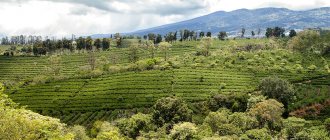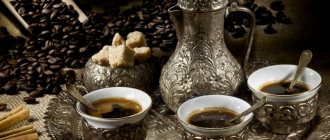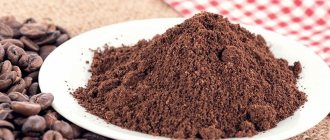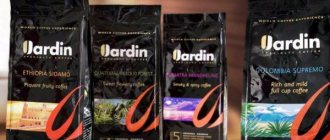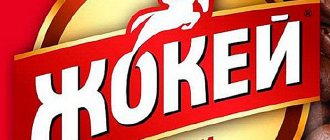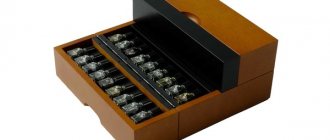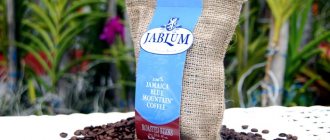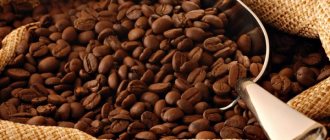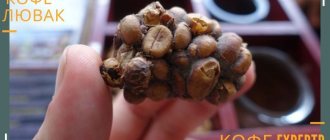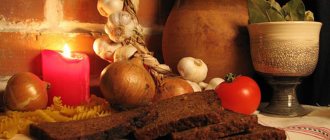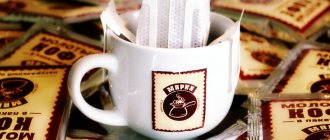The Blue Mountain Arabica variety is a Jamaican subspecies of Typica that has been growing in the Blue Mountains since the 1730s. Coffee has a soft aroma and a rich bouquet without the slightest hint of bitterness. Over the past few decades, Blue Mountain has earned a reputation as one of the most expensive and rare coffees in the world. More than 80% of the harvest is exported to Japan, where these beans are not only used to brew coffee, but also make Tia Maria coffee liqueur.
Jamaican Blue Mountain is a certified and protected brand, coffee under this name can only be produced in a designated region under the strict control of the Jamaican Coffee Industry Board of Jamaica. The possibility of awarding Blue Mountain status to beans is regulated by a special act – the Coffee Industry Regulation Act.
Coffee sommeliers describe the taste of Jamaica Blue Mountain as simultaneously soft, smooth, clean and bright. The aroma has very sweet floral tones; the bouquet reveals notes of nuts, cocoa, spices and even cream.
Features of the region
The Blue Mountains range stretches from Kingston to Port Antonio and reaches 2,256 meters at its highest point.
The region has a warm, humid climate with frequent rain and fog. The soil is fertile and does not lack irrigation. All this creates ideal conditions for the cultivation of excellent coffee.
Blue Mountain Arabica grows in the regions of St. Andrew, St. Thomas, Portland and St. Mary at an altitude of 910 to 1700 meters above sea level.
Coffee from plantations located at an altitude of 460-910 meters is called Jamaica High Mountain, beans grown below 460 meters are classified as Jamaica Supreme or Jamaica Low Mountain.
Jamaican coffee recipe
Jamaican coffee has a very extraordinary, multifaceted taste and aroma. It's not at all difficult to prepare. The main thing is to strictly follow the step-by-step instructions.
Ingredients
You will need the following products:
- 3 teaspoons ground Jamaica Blue Mountain coffee;
- 600 ml water;
- 3 teaspoons granulated sugar;
- salt (on the tip of a knife);
- 1 orange;
- half a lemon;
- 40 ml rum;
- 50 g powdered sugar.
Inventory
When preparing a coffee drink you will need the following equipment:
- knife;
- cezve;
- pot;
- kitchen stove;
- saucer;
- cup;
- strainer.
Step-by-step instruction
To prepare real Jamaican coffee, you need to follow these steps:
- Pour the crushed grains into the Turk.
- Add salt and sugar to the mixture.
- Mix the resulting mixture thoroughly and place on the stove.
- After warming up the container a little, pour in water.
- Wait until the foam appears and remove the Turk from the stove.
- Stir the rising grounds and put the dish back on the fire.
- After the first bubbles appear, set the cezve aside and cover with a saucer.
- Infuse the drink for five minutes.
- Wash the citrus fruits well and cut into thin slices.
- Place orange and lemon in a saucepan.
- Pour the prepared coffee on top.
- Place the dishes on the stove.
- Immediately after boiling, pour in the rum and add powdered sugar.
- Mix the resulting mass thoroughly.
- Once the powdered sugar has dissolved, remove the pan from the heat.
- Pour the resulting drink into glasses using a strainer.
- Garnish with a slice of lemon.
It is allowed to use whipped cream and all kinds of fruits as decoration.
If desired, you can use coffee balsam or cognac instead of rum. With their help, it will also be possible to give the drink a characteristic alcoholic tint.
Blue Mountain is one of the most expensive beans. Finding it on sale turns out to be problematic. As a rule, blends are presented that contain about 5% of these famous grains. Naturally, the taste of such a mixture will not be as harmonious as in the case of using a single variety. Therefore, when making a purchase, it is so important to carefully study the composition and make sure that there are no other types of beans in it.
Price
The Jamaica Blue Mountain variety is one of the most expensive in the world, and there are several reasons for this.
Most coffee plantations are located on flat ground, but Jamaica Blue Mountain is cultivated on the very tops of the mountains, which makes both work on the plantations and harvesting much more difficult. Growing this variety is fraught with considerable danger, which also affects the price.
In addition, Blue Mountain coffee is produced in small quantities - about 2 million kg per year, so demand significantly exceeds supply. Considering that 80% is sent to Japan, European or American coffee lovers have to literally fight for the remaining 400 thousand kg.
Finally, this variety undergoes several stringent quality checks, which requires labor and resources, and also reduces the final volume of grain delivered to the market.
How the famous Blue Mountain coffee came to be
The cultivation of legume trees in Jamaica began in the early seventies. The coffee industry gradually developed, new plantations appeared, and two centuries later the state managed to harvest a record harvest (15 tons). True, at that time there was no talk of the Blue Mountain variety.
With a significant increase in volumes, the quality of coffee beans did not improve. Therefore, many foreign customers stopped working with Jamaican suppliers. The result is the ruin of many enterprises. In order to re-enter the world market, it was decided to create a Council, which was designed to develop the industry.
Japan played an important role. Thanks to foreign investments, it was possible to significantly increase the yield and quality of grains. A cooperation contract was concluded between the countries, and already in the seventies of the 20th century the famous Jamaica Blue Mountain coffee was born.
The Blue Mountain brand supplies not only coffee products. This is the name given to grains grown in the Blue Mountains.
Fakes
Of course, such demand could not help but provoke a wave of counterfeits.
Some suppliers cheat and include Blue Mountain in blends, but in reality, such blends most often contain only a tiny percentage of the precious grains.
How to distinguish original from fake
- Certification mark. The Jamaica Coffee Board takes great care to ensure that only genuine Blue Mountain is labeled as such.
- Recommendations. There are several trusted suppliers: Blue Mountain Coffee, Coffees of Jamaica, J. Martinez and Company, Precious Provisions, Fresh Roasted Coffee.
Description of the variety
Coffee beans in Jamaica are harvested entirely by hand. They are processed using the wet method. In addition, they undergo special sorting. All beans are divided into categories. The highest among them is considered Grade-1. Such beans are only exported.
Jamaica Blue Mountain is considered the best among elite varieties. It is characterized by a balanced combination of sweetness and tartness, as well as a rich aroma. Gourmets appreciate it for its pleasant nutty hue, slightly perceptible sourness and long-lasting fruity aftertaste.
The variety is also considered unique due to the characteristics of growing beans. The plantations are small and located at great heights. Coffee fruits are exported in small quantities. They are placed in oak barrels, on which a stamp is placed confirming their belonging to the famous species. Due to this, it is possible to avoid counterfeits.
Other Jamaican Coffees
The plantations of this blessed country produce good Arabica crops. What other varieties of Jamaican coffee can be found on sale?
- Jamaica High Mountain . These are grains of high mountain origin, but outside the growing range of the famous Blue Mountain. Highland Jamaican coffee is not much inferior to its famous brother. Balanced taste and aroma, soft, devoid of bitterness, taste and a delicate fruity bouquet - these are the distinctive properties of this drink.
- Jamaica Prime . These grains are grown at significantly lower altitudes. But don't think of this coffee as low-grade. It has an expressive aroma and a good, bright taste. Like most Jamaican beans, this coffee is not overly strong, but rather delicate and refined. The brand under which Jamaican highlands beans are sold in the market is called Jamaica Mountain Choice Coffee. This is its official name, approved by the Jamaica Coffee Industry Council.
Jamaican coffee is an expensive variety.
1 kilogram of Blue Mountain will cost approximately 10 thousand rubles and more. When purchasing, pay attention to the quality of roasting, it is crucial. Heat treatment of grains carried out over high heat can completely “kill” the taste. Due to the reduced density, Jamaican coffee starts out roasted at low heat, which is then increased. Jamaican coffee enjoys increased attention among connoisseurs of the drink, so it is ideal as a gift for someone who likes to start the day with a cup of aromatic infusion.
What type of coffee do you prefer?
Price
The price of Blue Mountain coffee is very high.
There are a number of reasons for this:
Coffee plantations of this variety are located on high mountain peaks. This is very difficult both when harvesting crops and when working on plantations. Cultivation of this coffee is fraught with risk for the people working there, which contributes to its high cost.
Very little of it is produced. In total about 2 million kg. annually. Americans and Europeans are simply fighting among themselves for the remaining 20%. Because Japan takes the rest of the harvest. About 80% of the production is exported to Japanese regions where coffee liqueurs are made.
The quality of the variety is constantly checked. These are strict coffee quality checks that entail certain costs, both labor and financial.
Due to inspections, the volumes of grain products supplied to markets are reduced.
Jamaican Coffee Industry
Coffee from Jamaica is known all over the world, and some varieties are considered elite and are highly valued by gourmets. But this was not always the case; the country's coffee industry experienced not only a rapid rise, but also an even more rapid decline.
The introduction of coffee to Jamaica dates back to 1728, when Sir Nicholas Laws brought a cutting of a coffee tree from Martinique, France, to the Caribbean island. It was with him that the development of the industry began, which after several decades brought Jamaica to a leading position among exporters of coffee beans.
Very soon, local farmers noticed that the climate and soil were perfectly suitable for growing high-quality Arabica beans. Coffee plantations began to appear one after another and at the beginning of the 19th century their number exceeded 600, and the annual harvest amounted to thousands of tons. Jamaican coffee was exported all over the world, and the profits made up a significant portion of the government's total income.
Everything suddenly changed in the 30s of the 19th century. Slavery was abolished in Jamaica. A good cause had a negative impact on the coffee industry. After all, for the often difficult manual labor of picking and processing berries, which slaves used to do for free, hired workers demanded decent pay. But farmers were not ready to pay.
Because of this, many plantations were abandoned; in just a decade, their number sharply decreased. By the beginning of the 20th century, less than a third of operating farms remained, and even those, for the most part, produced low-quality products. This state of affairs did not suit the buyers, so almost all trade ties were interrupted.
It was not until the mid-20th century that government measures were taken to revive the once profitable industry. A special Council was created, which was supposed to exercise strict control over product quality, as well as build a marketing policy. Gradually, the coffee industry began to revive. Some of the lost markets were returned, and contacts were established with importers.
Business is moving slowly and so far the share of profits from the export of coffee beans in the Jamaican economy is very small. But the restoration of plantations, the consistently high quality of the product and its diversity give hope that the island nation will restore its position and regain its share of the coffee market.
